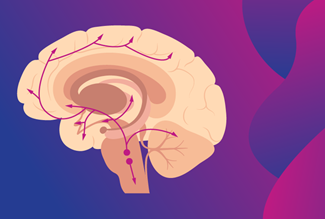About Us
Learn more about NP Psych Navigator and our mission to help nurse practitioners improve mental healthcare.

Clinical Insight
Dopamine and Serotonin Psychopharmacology Video
Dopamine and serotonin are neurotransmitters that are thought to regulate mood, behavior, and cognition, and their dysregulation may be associated with various psychiatric conditions. This video aims to help healthcare providers better understand the roles dopamine and serotonin may play in psychiatry.

Interactive Case Study
Patient Case Navigator: Differentiating Bipolar I Disorder From Major Depressive Disorder
Welcome to the Patient Case Navigator, an interactive learning experience for Nurse Practitioners. Please use the Next or Previous buttons at the bottom of the page to move forward or backwards.
Recommended on NP Psych Navigator

Clinical Article
Anhedonia and Cognitive Function in Adults With MDD: Results From the International Mood Disorders Collaborative Project
The International Mood Disorders Collaborative Project found a significant correlation between anhedonia and self-reported cognitive impairment in adults with major depressive disorder (MDD), which may help to identify individuals with MDD who are at higher risk of cognitive decline over time.

Clinical Article
Unrecognized Bipolar Disorder in Patients With Depression Managed in Primary Care: A Systematic Review and Meta-Analysis
Daveney et al explore the characteristics of patients with mixed symptoms, as compared to those without mixed symptoms, in both bipolar disorder and major depressive disorder.
NP Perspectives
When it comes to giving the best care to your patients, experience matters. Check out our Clinical Insights to hear from our vibrant community of nurse practitioners.
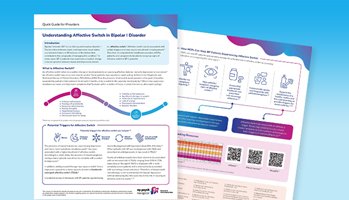
Quick Guide for Providers
Understanding Affective Switch in Bipolar I Disorder
Patients with bipolar I disorder (BP-1) may experience affective switch, which is a sudden transition in mood episodes between mania and depression. Affective switch can be triggered by certain medications as well as social or environmental factors. Learn how to recognize and monitor for signs of affective switch in patients with BP-1.
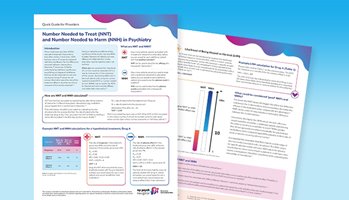
Quick Guide for Providers
Number Needed to Treat (NNT) and Number Needed to Harm (NNH) in Psychiatry
Number needed to treat (NNT) and number needed to harm (NNH) are metrics that can be used to evaluate the clinical relevance of findings from clinical trials. Together, NNT and NNH can be used to express the likelihood of being helped or harmed (LHH), which may be helpful for communicating and understanding the potential benefits and risks of a treatment. This quick guide will review the definitions, calculations, and interpretations of NNT, NNH, and LHH. For additional information, please visit our Clinical Insights section for a video featuring Dr Leslie Citrome on this topic.
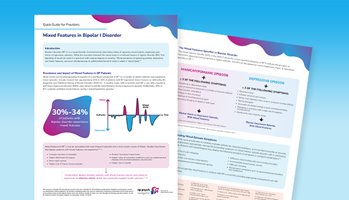
Quick Guide for Providers
Mixed Features in Bipolar I Disorder
Many patients with bipolar I disorder (BP-1) can experience mixed features, which is the simultaneous occurrence of depressive and manic symptoms. Mixed features can be associated with negative outcomes. Therefore, it is important for healthcare providers to evaluate BP-1 patients for the presence of mixed features to provide appropriate management strategies.
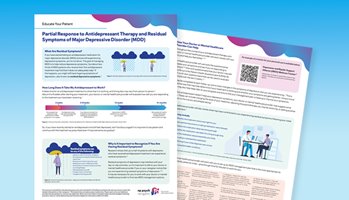
Educate Your Patient
Partial Response to Antidepressant Therapy and Residual Symptoms of Major Depressive Disorder (MDD)
Some patients with major depressive disorder (MDD) may experience lingering symptoms of depression, known as residual symptoms, with their initial antidepressant therapy. This patient resource provides MDD patients with information on what residual symptoms are, why they may experience them, how to recognize and monitor them, and how their healthcare providers can help manage them.

Test Your Knowledge
Predictors of Treatment-Emergent Affective Switch Quiz
Affective switch is a phenomenon that can occur in bipolar I disorder. In particular, affective switch can be triggered by certain medications in what is known as a treatment-emergent affective switch (TEAS), as well as by social and environmental factors. Test your knowledge of the potential symptoms and triggers of affective switch, including TEAS.

Clinical Article Summary
Anhedonia and Cognitive Function in Adults With MDD: Results From the International Mood Disorders Collaborative Project
The International Mood Disorders Collaborative Project found a significant correlation between anhedonia and self-reported cognitive impairment in adults with major depressive disorder (MDD), which may help to identify individuals with MDD who are at higher risk of cognitive decline over time.

Clinical Article Summary
Self-Reported History of Manic/Hypomanic Switch Associated With Antidepressant Use: Data From the Systematic Treatment Enhancement Program for Bipolar Disorder (STEP-BD)
The Systematic Treatment Enhancement Program for Bipolar Disorder (STEP-BD) study investigated treatment-emergent risk factors associated with manic and hypomanic episodes in patients with bipolar disorder. The results of this study provide insights into the prevalence of manic/hypomanic switch in patients undergoing antidepressant therapy and may help guide decisions on appropriate management.
Psychiatry Fundamentals
Psychiatry draws upon skills that are essential to the nurse practitioner approach to patient care, empathy, compassion, and understanding. A thorough knowledge of the different mental illnesses complements those skills.


